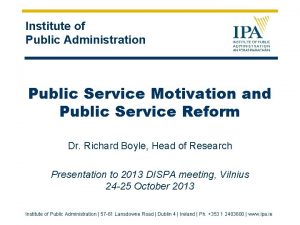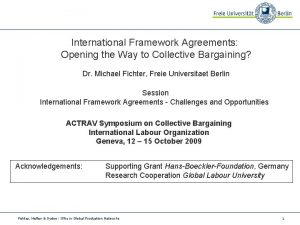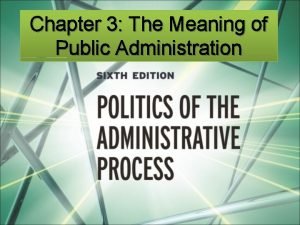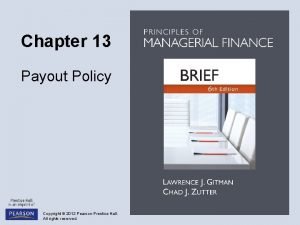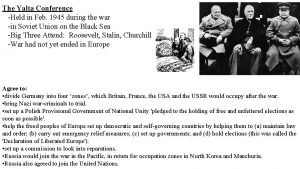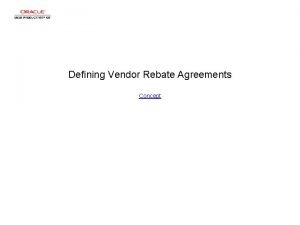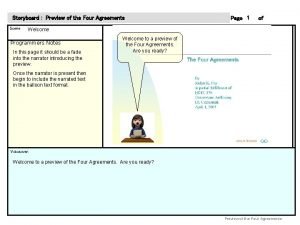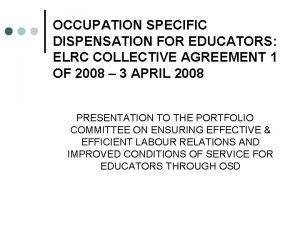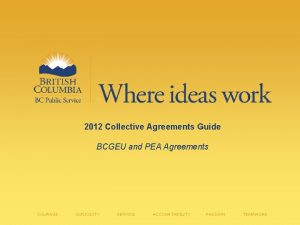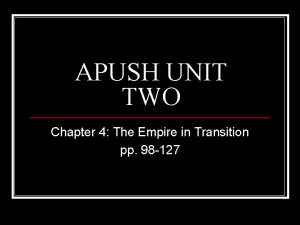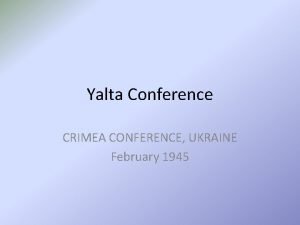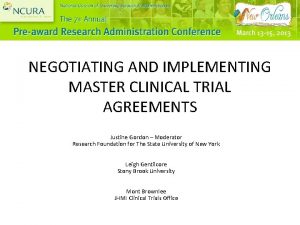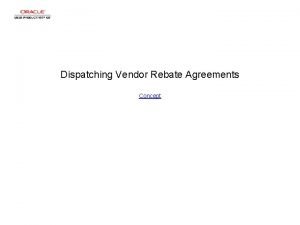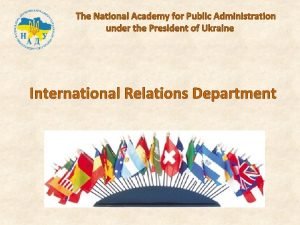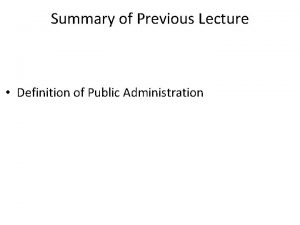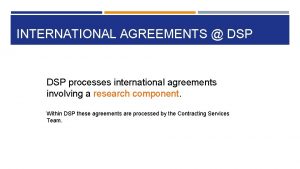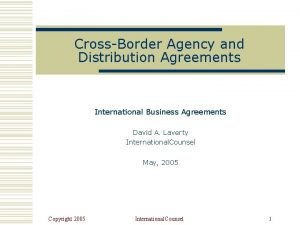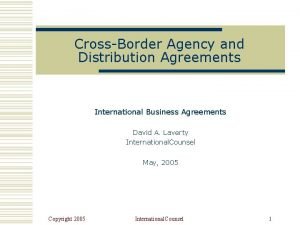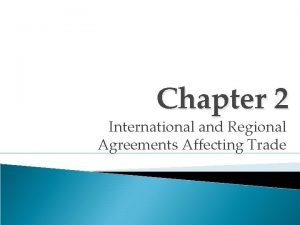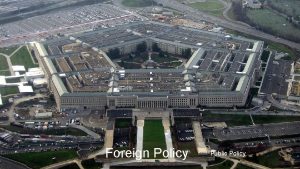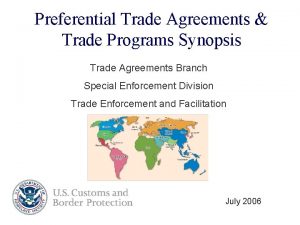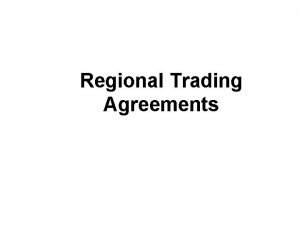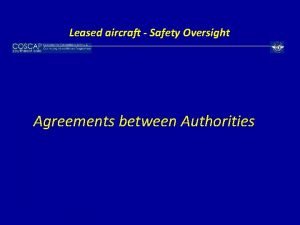International public administration International agreements affecting public policy

International public administration International agreements affecting public policy and administration 1

n Public policy and administrative reforms may be introduced as a result of international agreements among states n These are often drawn up under the auspices of an International Governing Organisation such as the IMF, WTO, WHO n Entry into agreement is referred to as accession, and the state which enters the Agreement becomes a `signatory’ or `party’ 2

n The agreement once entered or acceded to, imposes obligations on the signatory governments - they are then bound to implement its provisions n The Agreement is legally binding under international law 3

Examples n WTO Government Procurement Agreement Framework Convention on Tobacco Control ASEAN Agreement on Transboundary Haze Pollution International Convention for the Regulation of Whaling Vienna Convention for the Protection of the Ozone Layer OECD Convention on Combating Bribery of Foreign Public Officials 4

n Why should a government become a signatory to an agreement and be subject to the obligation to implement its provisions since by doing so: a) it forfeits some of its independence and sovereignty b) in some case it may derive benefits from the agreement without being a signatory and without implementing its provisions (can become a free rider) 5

First reason For agreements that cover the flow of information, resources, products and services between countries n A government may find that in being a signatory, it can avail itself of opportunities to further its interests in other countries n and if it is not a signatory, it may be denied those opportunities n The government will become a signatory if the benefits to be derived from such opportunities outweigh the disadvantages in subscribing to the obligations created by the agreement 6

E. g. Why have governments acceded to the WTO’s Government Procurement Agreement (GPA) since it compels a government to allow access to foreign suppliers in procurement? 7

a) If a government becomes a signatory to the GPA, businesses within its jurisdiction gain access to government procurement contracts in other countries (reciprocal advantage) b) If the a government does not become a signatory to the GPA, it may find that businesses within its jurisdiction may not be allowed to compete for procurement contracts in other countries c) The government will become a signatory so long as allowing access to foreign suppliers is politically acceptable and does not create social disadvantages that outweigh the benefits 8

Second reason For agreements that bestow benefits even on countries that do not accede (free-rider problem) n A government may become a signatory and refuse to be a free-rider since it may consider that if it became a free rider it would give reasons to other countries to become free riders so leading to the collapse of the agreement Providing the individual costs/advantges to that government in implementing its obligations do not outweigh the benefits to be gained from the agreement 9

Refusal to accede to an agreement due to costs outweighing the benefits n n The agreement banning commercial whaling created by the International Convention for the Regulation of Whaling (designed to preserve whale stocks in the future and preserve ecological balance in the oceans) has not been accepted by Norway and Russia ( and in effect by Japan) since in those countries commercial whaling is an important sector of the economy The individual cost/disadvantage in such cases outweigh the overall benefits to be derived from the agreement 10

Making the agreement n The agreement is often reached after several years of painstaking negotiation and compromise in which a consensus is reached n It is often difficult to arrive at such agreements given the different interests and values of the negotiating countries n One reason is that developed and devoloping countries often have different interests and values E. g. the attempt to arrive at WTO agreement on transparency in public procurement have stalled because certain developing countries object to full transparency 11

Precursors to an agreement n A fully fledged and legally binding Agreement is sometimes preceded by semi-formal cooperative arrangements between states, which are not binding under international law n These prior arrangements provide the precedents and the basis on which a fully fledged and binding agreement can be negotiated: E. g. ASEAN Agreement on Transboundary Haze Pollution, 2002 was preceded by: a) ASEAN Cooperation Plan on Transboundary Pollution, 1995 b) Regional Haze Action Plan, 1997 12

Negotiating the agreement n Two stage negotiations a) First stage - the negotiations to create a draft or set of recommendations that will determine the ultimate content of the agreement b) Second stage - this may be followed by negotiations to finalise the draft usually involving senior policy makers and government leaders of negotiating countries n Once a government enters i. e. becomes a signatory to the agreement (accession), it is then bound by the provisions of the agreement 13

National legislation for implementing the agreement n After accession, a signatory government (party) then must draft an instrument (a law or statute) containing the provisions of the agreement - this is called the instrument of ratification n The instrument will indicate how the government has interpreted the provisions n The instrument gives legal force to the provisions within a national jurisdiction, enabling them to implemented and enforced 14

n n Other legal instruments may be required to enable the provisions of the agreement to be implemented (e. g. the instrument of ratification may be supplemented by a special implementing law to specify the rules, procedures and definitions under which the agreement can be implemented and enforced) Other laws, that are directly and indirectly affected by the agreement, may have to be amended 15

Structure of an international agreement n An international agreement typically consists of the following sections: a) The preamble b) General and specific obligations c) Institutional framework d) Financial mechanisms e) Implementation mechanisms f) Reservations g) Annex 16

1. Preamble n Preamble usually includes statements of circumstances or need prefixed by words such as aware of, mindful of, considering, taking into account, recognising 17

n Example Vienna Convention for the Protection of the Ozone Layer: `The Parties to this Convention Aware of the potentially harmful impact on human health and the environment through modification of the ozone layer Taking into account the circumstances and particular requirement of developing countries Aware of the need for further research and systematic observation’ 18

Preamble cont. n The preamble may also contain statements of objectives and guiding principles 19

n n Example Framework Convention on Tobacco Control (WHO. May 2003) Objective To achieve a reduction in tobacco prevalence in order to protect present and future populations from the devastating health, social and economic consequences of tobacco consumption and exposure to environmental tobacco pollution Guiding principles As a result of the unique nature of tobacco products, normal trade practices are not applicable The public has the right to be fully informed about the health consequences of using tobacco products All people have the right to a tobacco free environment 20

2. Section on obligations The section on general obligations typically include the following obligations n Drafting of national measures by signatory governments (the agreement may specify the types of measures to be drafted) n Promotion of education, training and awareness n Facilitating cooperation in scientific research and in other matters n Exchange of information with other signatory governments 21

n Example Framework Convention on Tobacco Control Signatory governments to introduce measures: To control the advertising of tobacco To restrict consumption of tobacco in public places To require strong and visible health warnings on tobacco products To implement crop substitution for economies heavily dependent on tobacco and promote alternative viable economic activities for tobacco growers 22

3. Section on institutional framework n International agreements may contain a section covering the creation of an institutional framework, the most important parts of which are: a) The Conference of Parties b) Secretariat c) Scientific advisory committees and working groups d) Implementation Committee The institutional framework may form part of a relevant IGO or may lead to the creation of a new IGO 23

n The institutional framework is designed to: a) monitor implementation on the basis of reports surveys, and observations b) make adjustments to the agreement when necessary c) facilitate research, exchange of information etc d) to facilitate dispute settlement, and identify noncompliance and take necessary action 24

4. Section on financial mechanisms n Implementing an international agreement may be financially costly especially to developing countries n The agreement often contains provisions for the creation of funds to assist developing countries to make the economic, technological and organizational changes which are required and to finance the monitoring of the implementation of the agreement 25

5. Section on implementation mechanisms n International agreements often contain a section which stipulates what signatory governments are required to do in implementing the agreement 26

n The implementation mechanism laid down in the agreement may include a) The types of national legal instruments by which the agreement will be implemented b) The on-going reporting arrangements to which signatory governments must follow c) The evaluation of the reports by the Conference of Parties d) Enforcement and sanction arrangements in the case of non-compliance 27

d) How disputes between signatory governments or between a signatory government and Conference of Parties can be settled e. g. conciliation and arbitration procedures or recourse to an international court (question whether dispute settlement procedures should be mandatory or optional) e) What actions are to be taken, if any, in the event of non-compliance 28

Section on reservations n Individual signatory governments may insert reservations into a convention which exempts them from certain provisions (opt outs) Annex n List governments which are signatories, lists reservations, explains technical and legal terms, and may specify arbitration procedures 29

Monitoring the implementation of the agreement n It is crucial to monitor the implementation of an international agreement to determine: a) Extent of compliance b) Appropriate action in response to noncompliance 30

Monitoring activities n Scrutinise and determine adequacy of national legal instruments to implement the agreement by Implementation Committee and Conference of Parties n Submission of regular reports from signatory governments on progress of implementation and on actions taken in dealing with non-compliance n Assessment of reports by Implementation Committee and Conference of Parties 31

n n n On-site visits/observations on a yearly or regular basis involving discussions with relevant government leaders and policy makers and examination of necessary data On-site questionnaire to be completed by relevant agency of government Discussion with representatives of `civil society’ combined with questionnaire Assessment of observation reports, survey results, and evidence submitted by `civil society’ by Implementation Committee and Conference of Parties to determine amendments to the agreement when necessary 32

Enforcement action in case of non-compliance n IGO informs other signatory governments of defaulting government n IGO withholds or suspends aid n Signatory governments apply sanctions to defaulting government (especially when agreement affects exchange of goods and services) n IGO suspends membership of defaulting government 33
- Slides: 33
